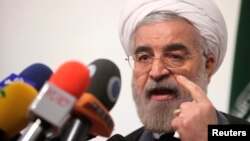Iran's president-elect is calling for a more free and open society, warning that a strong government is not a government that meddles in the private lives of its citizens.
Hassan Rowhani made the comments during a speech to a group of clerics Wednesday in Tehran. Parts of the speech were also put online through his Twitter account.
Rowhani said it is time for the government to embrace social media like Facebook, calling such sites a welcome phenomenon. He also said Iran must stop cracking down on Internet access, his official Twitter account saying "Widespread web filtering will only lead to increase in distrust." The post used the hashtags "#hope" and "#prudence."
The president-elect also told fellow clergy Iran's state-run media must be more open about Iran's problems. But he also said the government must pursue a path of "patience, rationality and moderation."
Rowhani surged to victory in Iran's presidential election in June after winning the support of reformists. He is set to take office at a swearing-in ceremony August 3.
Rowhani will take on an economy struggling with high unemployment and inflation, and crippled by international sanctions for the country's disputed nuclear program.
Iran's presidential vote was the first since President Mahmoud Ahmadinejad's disputed re-election in 2009 spawned widespread protests and a bloody crackdown by the government. Ahmadinejad, known internationally for his hostility toward the U.S. and Israel, was barred by law from a third term.
But like all Iranian presidents, Rowhani will have limited power. The country's supreme leader, Ayatollah Ali Khamenei, maintains the power to make Iran's major policy decisions.
Hassan Rowhani made the comments during a speech to a group of clerics Wednesday in Tehran. Parts of the speech were also put online through his Twitter account.
Rowhani said it is time for the government to embrace social media like Facebook, calling such sites a welcome phenomenon. He also said Iran must stop cracking down on Internet access, his official Twitter account saying "Widespread web filtering will only lead to increase in distrust." The post used the hashtags "#hope" and "#prudence."
The president-elect also told fellow clergy Iran's state-run media must be more open about Iran's problems. But he also said the government must pursue a path of "patience, rationality and moderation."
Rowhani surged to victory in Iran's presidential election in June after winning the support of reformists. He is set to take office at a swearing-in ceremony August 3.
Rowhani will take on an economy struggling with high unemployment and inflation, and crippled by international sanctions for the country's disputed nuclear program.
Iran's presidential vote was the first since President Mahmoud Ahmadinejad's disputed re-election in 2009 spawned widespread protests and a bloody crackdown by the government. Ahmadinejad, known internationally for his hostility toward the U.S. and Israel, was barred by law from a third term.
But like all Iranian presidents, Rowhani will have limited power. The country's supreme leader, Ayatollah Ali Khamenei, maintains the power to make Iran's major policy decisions.





